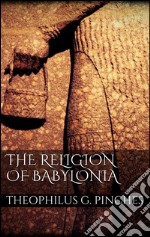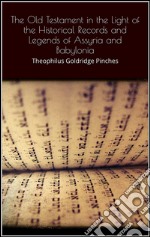Theophilus G Pinches eBooks
eBooks editi da Theophilus G Pinches di Formato Mobipocket
The religion of Babylonia. E-book. Formato Mobipocket Theophilus G. Pinches - Theophilus G. Pinches, 2016 -
Though there is no proof that ancestor-worship in general prevailed at any time in Babylonia, it would seem that the worship of heroes and prominent men was common, at least in early times. The tenth chapter of Genesis tells us of the story of Nimrod, who cannot be any other than the Merodach of the Assyro-Babylonian inscriptions; and other examples, occurring in semi-mythological times, are /En-we-dur-an-ki/, the Greek Edoreschos, and /Gilgameš/, the Greek Gilgamos, though Aelian's story of the latter does not fit in with the account as given by the inscriptions. In later times, the divine prefix is found before the names of many a Babylonian ruler—Sargon of Agadé,[1] Dungi of Ur (about 2500 B.C.), Rim-Sin or Eri-Aku (Arioch of Ellasar, about 2100 B.C.), and others. It was doubtless a kind of flattery to deify and pay these rulers divine honours during their lifetime, and on account of this, it is very probable that their godhood was utterly forgotten, in the case of those who were strictly historical, after their death. The deification of the kings of Babylonia and Assyria is probably due to the fact, that they were regarded as the representatives of God upon earth, and being his chief priests as well as his offspring (the personal names show that it was a common thing to regard children as the gifts of the gods whom their father worshipped), the divine fatherhood thus attributed to them naturally could, in the case of those of royal rank, give them a real claim to divine birth and honours.
The Old Testament in the light of the historical records and legends of Assyria and Babylonia. E-book. Formato Mobipocket Theophilus Goldridge Pinches - Theophilus Goldridge Pinches, 2016 -
To find out how the world was made, or rather, to give forth a theory accounting for its origin and continued existence, is one of the subjects that has attracted the attention of thinking minds among all nations having any pretension to civilization. It was, therefore, to be expected that the ancient Babylonians and Assyrians, far advanced in civilization as they were at an exceedingly early date, should have formed opinions thereupon, and placed them on record as soon as those opinions were matured, and the art of writing had been perfected sufficiently to enable a serviceable account to be composed. This, naturally, did not take place all at once. We may take it for granted that the history of the Creation grew piece by piece, as different minds thought over and elaborated it. The first theories we should expect to find more or less improbable—wild stories of serpents and gods, emblematic of the conflicting powers of good and evil, which, with them, had their origin before the advent of mankind upon the earth. But all men would not have the same opinion of the way in which the universe came into existence, and this would give rise, as really happened in Babylonia, to conflicting accounts or theories, the later ones less improbable than, and therefore superior to, the earlier. The earlier Creation-legend, being a sort of heroic poem, would remain popular with the common people, who always love stories of heroes and mighty conflicts, such as those in which the Babylonians and Assyrians to the latest times delighted, and of which the Semitic Babylonian Creation-story consists. As the ages passed by, and the newer theories grew up, the older popular ones would be elaborated, and new ideas from the later theories of the Creation would be incorporated, whilst, at the same time, mystical meanings would be given to the events recorded in the earlier legends to make them fit in with the newer ones.

